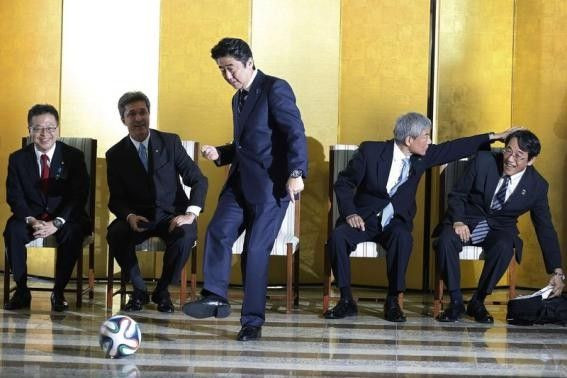Global Markets Overview – November 19, 2014

Japan to be the final macro mover of 2014
The final market altering event of 2014 is now underway.
I've been keenly watching political and fiscal events that have transpired in Japan over the past month. Last night they reached a pinnacle at Prime Minster Abe's press conference.
His first announcement was a forgone conclusion considering the nation has slipped back into recession, with the PM postponing the second consumption hike by 18 months to April 2017. Not hard to understand considering personal consumption in Japan has not recovered since the first rise in April this year. It fell 18.7% in the second quarter and only recovered 1.5% in the third.
The second part to the press conference was what most of us had been waiting to hear.
As speculated in the press for the past three weeks, the PM announced that a snap election is to be held. Although no specific election date was given, the announcement that the Lower House will be dissolved on Friday November 21 is the clearest indication a December 14 election date will be chosen. As the incumbent, he will want to use speed to his advantage and the shortest possible campaign will work in his favour due to the disarray of his opponents.
Coupled with the election announcement, Abe stated he has asked the Council on Economic and Fiscal Policy to draw up a ¥3 trillion stimulus program to boost person consumption (basically pre-announced by Finance Minister Amari yesterday). Both measures are directly targeting households and it's likely he will use this along with further ramping up of Abenomics in his election campaign.
He has certainly thrown himself to the will of the people around the progress of Abenomics. Last night, he said:: "I thought we should test the will of the people... if the coalition doesn't keep its majority, we cannot push forward the three arrows and Abenomics. If we don't get a majority, it would be a rejection of Abenomics and I would resign."
There is growing condemnation of Abenomics and whether its stated goals are achievable and whether the policy settings are correct. From a market perspective, however, like with QE, like with the ECB's bond buying program spending your way out has guaranteed one thing over the last six years of unconventional global monetary policy - domestic asset appreciation and a softer domestic currency. I remain convinced that whatever the outcome of the election, the BoJ will continue and even increase its stimulus program as will any Japanese government (long USD/JPY) and, in turn, that will push equities higher (long Nikkei).
Ahead of the Australian Open
With most concentrating on the news from Japan, some may have missed the China house data. 69 of the 70 cities which the government tracks contracted in the past month. The fear that China property prices are cooling is sending industrial commodities into a spin specifically iron ore which is now at its lowest level in five years (July 2009) at US$71.80 a tonne. Iron ore has fallen 47% this year if China sees sustained cooling in the housing market in 2015, there is no doubting iron ore will be lower still.
We are calling the Australian market up 21 points to 5420. Considering the sustained slide in the defensive plays over the past seven days, some will see this as a buying opportunity and are likely to support this side of the market. However, it will be hard for materials to look past the data coming out of China and the current spot price in iron ore. Pure plays are in for a rough trading day indeed, as more find themselves underwater.
Asian markets opening call | Price at 8:00am AEDT | Change from the Offical market close | Percentage Change |
Australia 200 cash (ASX 200) | 5,420.50 | 21 | 0.39% |
Japan 225 (Nikkei) | 17,436.60 | 93 | 0.53% |
Hong Kong HS 50 cash (Hang Seng) | 23,533.20 | 4 | 0.02% |
China H-shares cash | 10,478.20 | 52 | 0.50% |
Singapore Blue Chip cash (MSCI Singapore) | 375.19 | 2 | 0.40% |
US and Europe Market Calls | Price at 8:00am AEDT | Change Since Australian Market Close | Percentage Change |
WALL STREET (cash) (Dow) | 17,727.30 | 82 | 0.47% |
US 500 (cash) (S&P) | 2,055.43 | 14 | 0.71% |
UK FTSE (cash) | 6,726.00 | 44 | 0.68% |
German DAX (cash) | 9,488.10 | 169 | 1.82% |
Futures Markets | Price at 8:00am AEDT | Change Since Australian Market Close | Percentage Change |
Dow Jones Futures (December) | 17,692.50 | 82.00 | 0.47% |
S&P Futures (December) | 2,052.88 | 14.00 | 0.69% |
ASX SPI Futures (December) | 5,430.50 | 20.00 | 0.39% |
NKY 225 Futures (December) | 17,467.50 | 110.00 | 0.63% |
Key inputs for the upcoming Australian trading session (Change are from 16:00 AEDT) | Price at 8:00am AEDT | Change Since Australian Market Close | Percentage Change |
AUD/USD | $0.8729 | 0.0010 | 0.12% |
USD/JPY | ¥116.940 | 0.335 | 0.29% |
Rio Tinto Plc (London) | £30.34 | -0.24 | -0.80% |
BHP Billiton Plc (London) | £16.59 | -0.09 | -0.57% |
BHP Billiton Ltd. ADR (US) (AUD) | $32.97 | -0.21 | -0.63% |
Gold (spot) | $1,195.20 | 8.30 | 0.70% |
Brent Crude (January) | $78.48 | -0.43 | -0.54% |
Aluminium (London) | 2015 | -14.00 | -0.69% |
Copper (London) | 6627.5 | -72.50 | -1.08% |
Nickel (London) | 15640 | -149.00 | -0.94% |
Zinc (London) | 2252 | -5.25 | -0.23% |
Iron Ore (62%Fe) | $71.80 | -3.30 | -4.39% |
[Kick off your trading day with our newsletter]
More from IBT Markets:
Follow us on Facebook
Follow us on Twitter




















